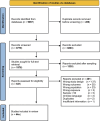A systematic review of maternal and perinatal health outcomes in the context of epidemic threats: towards the development of a core outcome set
- PMID: 40784940
- PMCID: PMC12337472
- DOI: 10.1186/s40748-025-00215-w
A systematic review of maternal and perinatal health outcomes in the context of epidemic threats: towards the development of a core outcome set
Abstract
Objective: To systematically identify and classify maternal and perinatal health outcomes reported in research conducted in the epidemic and pandemic context.
Study design and setting: We conducted a systematic review following Cochrane Methods. We searched MEDLINE, EMBASE, LILACS, SCI-EXPANDED, CINAHL, Cochrane Central Register of Controlled Trials, PsycINFO, AMED, ClinicalTrials.gov and ICTRP, between January 2015 and March 2023. Experimental, quasi-experimental, observational studies, phase IV trials, and post-marketing studies, published protocols and ongoing registered studies reporting maternal and perinatal health outcomes were included. Studies only reporting coverage of interventions, access to routine health services, clinical presentation of infectious diseases, and reviews were excluded. A sampling strategy was used for COVID-19 studies, due to their very high numbers. Outcome verbatims were extracted and categorized in unique outcome, and further classified into domains and subdomains. Frequency of outcome reporting was calculated.
Results: 94 maternal and pregnancy and 47 unique neonatal outcomes were identified, from a total of 917 and 657 verbatims, respectively, reported across 440 included studies. At least 20% of included studies reported maternal and pregnancy outcomes of mode of delivery (56.1%), stillbirth (33.0%), preterm birth (28.6%), hypertensive disorders of pregnancy (26.6%), and maternal death (20.7%). These outcomes were identified across all three types of studies identified (epidemiological, product development or post-authorization surveillance). Gestational age at birth (29.8%), congenital malformations of the nervous system (26.1%), birth weight (23.4%), neonatal admission to intensive care unit (23.2%), and neonatal death (19.1%) were the most frequently reported neonatal outcomes.
Conclusions: Our study provides the basis for developing a core outcome set to measure maternal and perinatal health during outbreaks, which would help improve data collection of harmonized data, data synthesis, and timely development of informed public health guidance and clinical care responding to the needs of pregnant women.
Keywords: Epidemics; Maternal; Newborn; Pandemic; Pregnancy; Systematic review.
© 2025. World Health Organization.
Conflict of interest statement
Declarations. Ethics approval and consent to participate: Not applicable. Consent for publication: Not applicable. Competing interests: The authors declare no competing interests.
Figures
Similar articles
-
Metformin for women who are overweight or obese during pregnancy for improving maternal and infant outcomes.Cochrane Database Syst Rev. 2018 Jul 24;7(7):CD010564. doi: 10.1002/14651858.CD010564.pub2. Cochrane Database Syst Rev. 2018. PMID: 30039871 Free PMC article.
-
Induction of labour for improving birth outcomes for women at or beyond term.Cochrane Database Syst Rev. 2018 May 9;5(5):CD004945. doi: 10.1002/14651858.CD004945.pub4. Cochrane Database Syst Rev. 2018. Update in: Cochrane Database Syst Rev. 2020 Jul 15;7:CD004945. doi: 10.1002/14651858.CD004945.pub5. PMID: 29741208 Free PMC article. Updated.
-
Regimens of ultrasound surveillance for twin pregnancies for improving outcomes.Cochrane Database Syst Rev. 2017 Nov 7;11(11):CD011371. doi: 10.1002/14651858.CD011371.pub2. Cochrane Database Syst Rev. 2017. PMID: 29108135 Free PMC article.
-
Treating periodontal disease for preventing adverse birth outcomes in pregnant women.Cochrane Database Syst Rev. 2017 Jun 12;6(6):CD005297. doi: 10.1002/14651858.CD005297.pub3. Cochrane Database Syst Rev. 2017. PMID: 28605006 Free PMC article.
-
Vitamin D supplementation for women during pregnancy.Cochrane Database Syst Rev. 2024 Jul 30;7(7):CD008873. doi: 10.1002/14651858.CD008873.pub5. Cochrane Database Syst Rev. 2024. PMID: 39077939 Free PMC article.
References
Publication types
Grants and funding
LinkOut - more resources
Full Text Sources



